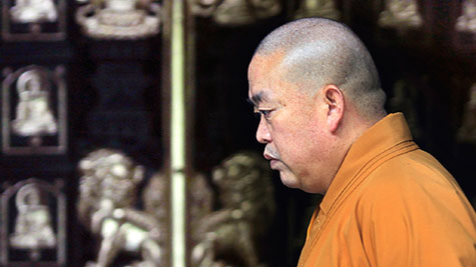
The case of Shi Yongxin, former abbot of the world-renowned Shaolin Temple, has sounded an alarm for the entire Buddhist community in China, the Buddhist Association of China said in a statement on Thursday.
On July 27, the Shaolin Temple announced that Shi was under investigation by multiple authorities for allegedly embezzling funds and having affairs with various women, resulting in him fathering at least one child. Two days later, the association revoked Shi's ordination certificate, which is proof of acceptance into the monastic community.
"Only by bravely facing and deeply reflecting, drawing lessons from Shi's serious mistakes and taking them as a warning, can Buddhists achieve personal spiritual advancement and the Buddhist community develop healthily," the statement said.
READ MORE: Buddhist Association revokes ordination certificate of Shi Yongxin
The association said it firmly supports the relevant departments in lawfully handling Shi's case and vowed to advance comprehensive and strict governance of the Buddhist community. Those who violate precepts and rules will be resolutely disciplined, it added.
Born in 1965, Shi became a monk in 1981 and had served as the 30th abbot of the 1,500-year-old temple in a mountain range in Central China's Henan province since 1999. He is also known as the first Chinese abbot to hold a master's degree in business administration.
The statement said Shi's actions not only ruined his own spiritual life and wisdom but also damaged the ethical standards of Buddhism. They have tarnished the image of the monastic community and caused serious negative impacts on the promotion of Buddhism, it said. Shi may face severe legal punishment and, according to the karmic law of Buddhism, bear serious karmic consequences.
READ MORE: Wang called on Buddhist community to promote peace and progress
Shi's case has exposed loopholes in the management of Buddhist organizations and venues, the association said. Internal supervision mechanisms in the Buddhist community need further improvement, it said. Meanwhile, some Buddhist religious leaders have been negligent in their practice, lax in self-discipline, and have allowed their faith to waver, ultimately losing the ethical standards Buddhists should uphold, it added.


